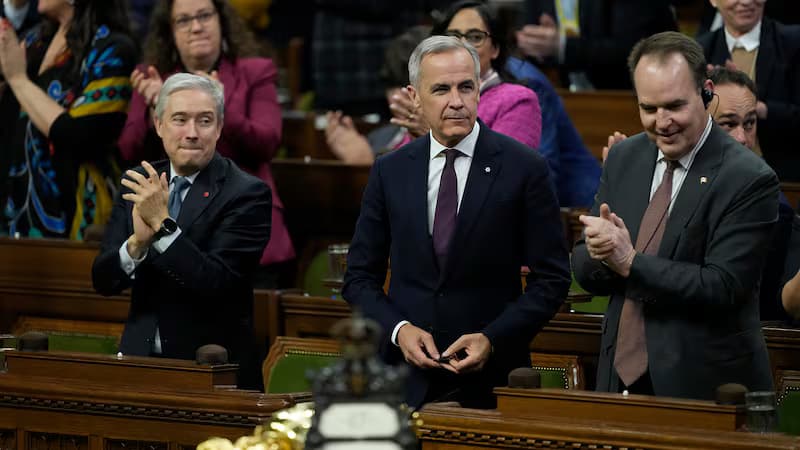We're loading the full news article for you. This includes the article content, images, author information, and related articles.
Canada's new government survives a critical confidence vote on a massive spending plan. For Kenya, the budget's deep cuts to foreign aid signal a potential shift in a key development partnership.

OTTAWA – Prime Minister Mark Carney’s minority Liberal government narrowly survived a high-stakes confidence vote on Monday, securing parliamentary approval for its first federal budget by a razor-thin margin of 170 to 168. The passage of the fiscal plan, which projects a C$78.3 billion (approx. KSh 7.2 trillion) deficit for the 2025-26 fiscal year, averts an early election that would have plunged Canada into political uncertainty. The vote took place in Ottawa on Monday, November 17, 2025, concluding weeks of intense political negotiation.
The government, led by Mr. Carney who took office on March 14, 2025, holds 169 seats, just two short of a majority in the 343-seat House of Commons. The budget’s survival depended on external support. This came critically from Green Party Leader Elizabeth May, who cast a decisive vote in favour. Additionally, the abstention of four opposition MPs—two from the New Democratic Party (NDP) and two from the Conservative Party—was crucial in preventing the government's collapse.
Ms. May’s support was secured only after Prime Minister Carney publicly gave a “firm commitment” that his government would meet Canada’s obligations under the Paris Agreement on climate change. “I’m going to vote ‘yes’ for the country, for the planet and for my hope in the future,” Ms. May announced to reporters on Parliament Hill shortly before the vote, framing her decision as a move to prevent an unwanted election and advance environmental policy.
The budget, presented by Finance Minister François-Philippe Champagne on November 4, 2025, has been defended by the Carney government as a “generational investment” designed to bolster Canada’s economy, particularly in housing and defence. However, it has faced sharp criticism from the official opposition. Conservative Party leader Pierre Poilievre condemned the plan for its “fiscal recklessness,” arguing the large deficit—the largest in Canadian history outside the COVID-19 pandemic—could fuel inflation.
While the parliamentary drama unfolded thousands of kilometres away, the budget contains significant implications for Kenya. A key measure announced is a C$2.7 billion cut to Canada's foreign aid budget over the next four years. The plan specifies reductions in funding for global health initiatives and transfers to international financial institutions. This move signals a potential recalibration of Canada's role as a key development partner in regions including East Africa.
Canada and Kenya share long-standing diplomatic and economic ties, established in 1963. According to Global Affairs Canada, bilateral trade is significant, with Canadian exports to Kenya—primarily wheat and aerospace products—reaching C$110.8 million in 2023, while imports from Kenya, mostly coffee and tea, totalled C$46.4 million. Canada's High Commission in Nairobi is its largest diplomatic mission in Africa, underscoring the strategic importance of the relationship.
Furthermore, Canada has been an important partner in regional security, providing military training to Kenyan officers through the Military Training and Cooperation Programme since 1970. In February 2025, Canada announced over C$87 million in new development assistance for projects in Africa, including the Makueni Women’s Empowerment Project in Kenya. The budget's planned aid reductions raise questions about the future scale of such programs. Officials have stated the cuts will return Canada's aid spending to pre-pandemic levels, but non-governmental organizations have warned that this represents a retreat from the world stage at a critical time for developing nations.
Prime Minister Carney, a former governor of both the Bank of Canada and the Bank of England, is steering his country through a period of global economic uncertainty. His government has framed the expansionary budget as a necessary response to international pressures, including trade challenges. The focus on domestic investments and a simultaneous cut in international development assistance reflects a broader trend among some Western nations re-evaluating foreign spending priorities. For Kenya and other recipient nations, this shift necessitates a closer watch on the future of development partnerships and the need to diversify sources of international support. FURTHER INVESTIGATION REQUIRED into the specific programs affecting Kenya.
Keep the conversation in one place—threads here stay linked to the story and in the forums.
Sign in to start a discussion
Start a conversation about this story and keep it linked here.
Other hot threads
E-sports and Gaming Community in Kenya
Active 9 months ago
The Role of Technology in Modern Agriculture (AgriTech)
Active 9 months ago
Popular Recreational Activities Across Counties
Active 9 months ago
Investing in Youth Sports Development Programs
Active 9 months ago